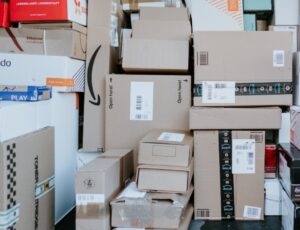
Rory O’Connor, founder and CEO of Scurri, a provider of software that connects and optimises ecommerce ordering, shipping and delivery process, discusses the reopening of stores.
Covid-19 has transformed large swathes of the economy in remarkable and generally not very positive ways. Pretty much every sector has had to learn to do things differently. Staff toil from home, while those who have remained in the office practice social distancing. Supply chains are disrupted and demand falls off a cliff.
However, few areas of the economy are experiencing bigger levels of shock and upset than retail. And when the virus has finally been quashed and things have returned to a ‘new normal’, there are several ways in which retail will probably be changed completely and forever. The coming weeks and months, as some but not all retailers reopen, will be all about survival for business owners; big or small.
It is everyone’s duty to shop local if possible
We must do our bit to support independent retailers as best we can to ensure their survival for a post-pandemic future. The cafes, bookstores, flower shops, design shops, and delis that line our villages and main streets are vital to our communities.
They centre community life, contributing to the close-knit feel of our localities and forging a sense of belonging amongst residents. In isolating times such as these, when our worlds have shrunk to fit within a few kilometres’ radius, upholding this solidarity and sense of togetherness is more important than ever.
If people have the means, making a concerted effort to spend money locally could save jobs; helping ensure villages and towns across the UK can reopen when the crisis is over.
Digitalisation as a safeguard amid the coronavirus crisis
However, for those businesses that have been online, or are in the process of digitising their offer, the online world is providing a safe haven amid the coronavirus crisis. Small businesses have taken to Twitter, Instagram, and other social media sites to remind customers that despite their brick and mortar shops being closed, their online stores are still open.
Restaurants and coffee shops have been very quick to find a way from table service to takeaway. Coffee shops that are closed have focused on the sale and delivery of coffee beans to customers, while many restaurants have stepped up deliveries.
Instagram remains one of the best platforms to have that virtual retail experience, as retailers want to be able to talk to customers as if they were coming into the shop.
However, the world needs to be open to digitalisation too, with the complexity that people will have less money to spend. People’s consumer habits have changed, so has the world. With shop fronts more or less still shuttered across the country, many small businesses have been looking at their options online. But it’s not a route every business can take.
Advice for local shops – making the leap to online and niche
Once people have got used to a new habit like online shopping, it is difficult to change their habits. For small local shops to compete with ecommerce shops selling their items on Amazon or eBay, small business owners are advised to offer personalised service and niche products.
Personalisation and niche will be the future. As Amazon doesn’t go down this line, being a niche player will allow a local shop to become a specialist retailer.
The new ecommerce winners
Clothes, household goods and electrical appliances; at present, these are the three main categories of online retailing. There is a lot happening in these markets in terms of overall number of online stores selling popular products and the number of related searches and search results.
Imagine you were the only retailer, or one of a small few, selling an unusual, niche product. As incredible as it may seem, a large number of the most successful online stores offer products you didn’t even know existed.
The reason for the success of side-line products is simple. Whenever many search results are spread out over several suppliers, each of these suppliers will receive only a small piece of the cake. However, if just a few searches a month are redirected to one or just a few retailers, the cash registers start ringing.
Less competition, higher profit margins
One major aspect of niche markets is the lack of competitive pressure. Besides ruining a retailer’s profit margin and therefore affecting their prices, competitive pressure usually also means having to spend a lot of money on advertising, so that customers can find them easily online.
The battle for the leading position in search engine results can be an expensive one. However, if someone is selling online niche products such as fishing rods or cameras, they don’t have this problem. Your store will appear on page one on Google.
Retailers who have built up a high market share within a niche market often benefit from great profit margins. Other benefits include little competition, no price wars, and low advertising costs.
Cross-selling in the ecommerce niche
Niche products rarely come on their own. They’re often accompanied by specialized accessories, which opens up opportunities for cross-selling accessories, resulting in higher profits.
An online store targeting niche markets also allows a retailer to produce much more tailored, high-quality content. Use the blog feature of your ecommerce platform to write about their products and industry.
Stand out from Amazon and eBay
Nowadays, you can nearly find anything on Amazon or eBay. However, as most people searching for a certain product do not know the exact serial number or unique product name, it is hardly possible to find the exact product you need on Amazon. Amazon and eBay don’t have the possibility of presenting every version of each product along with a description for each.
On the other hand, your product pages offer you the opportunity to set up URLs in such a way that they contain the name of the product itself. This has a very positive impact on your ranking in search engine results.
Another benefit that online shoppers’ value when looking for niche products: a specialized online store displaying professional knowledge and expert support.
Therefore, always make sure to show your expertise. Offer your customers what Amazon cannot offer; downloadable product images and telephone (or Live Chat) customer service allowing customers to speak with experts. Informative blog posts and product descriptions will also help you stand out from Amazon and eBay. Ultimately, people enjoy buying from real people.
Learning the online ropes
Last but not least, for those businesses hoping to make a longer-term investment in their online presence, there are several online training options. Facebook is running a free weekly training event online called ‘Boost with Facebook’. It goes live on Thursdays at 12pm. The first recently took place in partnership with Shopify covering the basics of building a website.
The prospects of trading online can be daunting for businesses who haven’t conducted commerce in the online domain before. Future seminars will look at topics such as marketing your product effectively on mobile. Also, hosting a virtual event and using different channels to communicate with a diverse range of customers.
For more information on Scurri, please click here.












